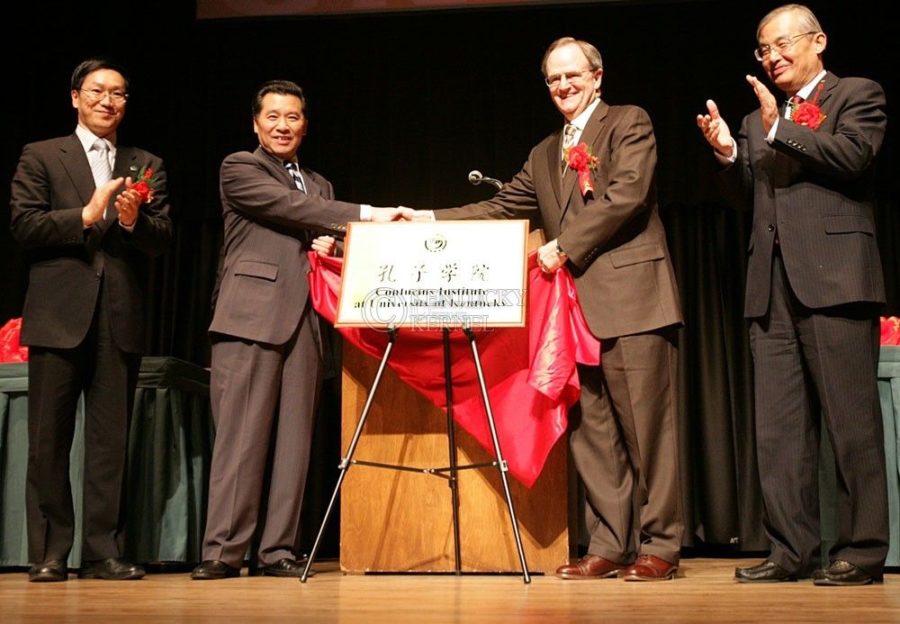UK closing Confucius Institute, effective immediately
March 3, 2021
Effective immediately, the University of Kentucky will close its branch of the Confucius Institute, an educational partnership with China present at many universities, due to “ongoing tensions between our two countries.”
According to an email sent to campus members by President Eli Capilouto, the closure is due to “strong federal regulatory concern” and the university’s ability to receive funding from the U.S. Department of Defense.
“We cannot allow the crosscurrents of federal policy and geopolitics – important issues in their own right — to jeopardize our research and service efforts,” Capilouto said.
According to his email, nine of UK’s colleges receive ‘significant’ DOD research and academic funding.
“That’s some $50 million in the last five years alone with nearly 50 active projects and another 50 in the proposal stage,” Capilouto said.
UK’s Confucius Institute has five employees, including a visiting scholar from China.
Executive director of UK Confucius Institute Huajing Maske said she was proud of the program and its service.
“In our globalized world, the United States and China cannot thrive without each other. We are proud of the work the UK Confucius Institute has performed over the past eleven years to bring the people of China and Kentucky closer together. We look forward to finding a new path forward to continue our important efforts.”
UKCI operates Chinese language and culture programs in regional K – 12 schools. According to its website, UKCI has funded $110,000 for UK students and faculty since 2016 and “provided over $467,000 in programming for UK’s campus and the community in 2017.”
The institute is connected to 14 of UK’s 16 colleges and has assisted more than 250 students with travel abroad in the last five years.
The closure comes at a time when anti-Asian prejudice is on the rise. Multiple outlets have reported increases in hate crimes against Asian Americans since the pandemic began, partly due to officials calling COVID-19 the “China virus.”
According to an Inside Higher Ed article, more than 10 American universities closed their Confucius Institutes between 2018 and 2019.
The University of Rhode Island closed its Confucius Institute for the same reason UK is citing.
The risk to funding arises from the National Defense Authorization Act, which “prohibits the Defense Department from funding Chinese language programs at institutions that host Confucius Institutes except in cases in which the institutions have obtained a waiver,” Inside Higher Ed reports.
UK’s announcement to close its Confucius Institute came less than 24 hours after the state legislature in Utah heard a proposal to ban CIs at state universities.
Critics have said CIs emulate China’s government control. A report from the the American Association of University Professors said that agreements between universities and CIs “feature nondisclosure clauses and unacceptable concessions to the political aims and practices of the government of China.”
Capilouto said UK would exercise “provisions that allow us to pull out of our contract as part of a necessary transition.”
Critics of universities’ decisions to close CIs say that ceding a campus program due to concerns over U.S. federal funding allows the U.S. government to interfere in curriculum, a move emblematic of the kind of government influence those who wish to close CIs are concerned about from China.
In his email, Capilouto said the decision did not affect UK’s commitments to its international students.
Students from China account for more than a third of UK’s international student population. According to UK’s international enrollment site, there are 550 students from China enrolled at UK equaling 36.69% of the university’s total international enrollment.
“Tremendous students and faculty come to UK from China, who undeniably contribute to our campus. Many of our students, faculty and staff study in and visit China as well, making indelible contributions to their educations and to scholarship,” Capilouto wrote.
He said that UKCI has positively impacted thousands of Kentuckians through its programs, which are “unsustainable” in light of the university’s “ability to receive federal funding for research grants from the Department of Defense (DOD).”
The National Association of Scholars reports that there are 55 CIs in the United States, down from a high of about 90 in the 2010s. Included in their list are three besides UK that are scheduled to close.
Lawmakers have testified to Congress that they believe CIs are a national security threat. University academics who oppose CIs say they object to China’s policies on free speech and discourse.
According to the New York Times, U.S. and China relations are intensifying due to trade, technology and human rights disagreements.
UKCI was first founded in 2010.
































































































































































